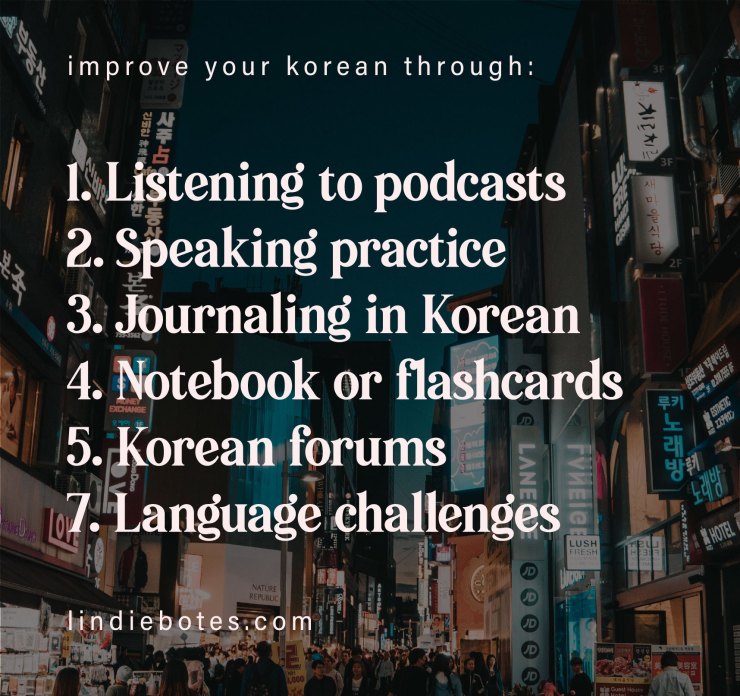Improve your Korean in 6 unique ways
You may have just finished your Korean textbook or passed your first Korean class. Now you feel accomplished but not sure where to go next. You might be bridging the gap from beginner to intermediate, or making your way from intermediate to advanced. Wherever you are in your journey, there are a few things you can incorporate into your day to improve your Korean fast. Note that most of the tips in this post might not apply to beginner learners.

1. LISTEN TO PODCASTS IN KOREAN (NOT JUST ABOUT KOREAN)
If you’re over listening to podcasts and audio lessons like TTMIK and Koreanpod101, you might want to try listening to podcasts made for the Korean market. Here are my favorites that I listen to on Google Podcasts:

Description (KR): 이 방송은 한국문화예술위원회에서 운영하는 인터넷 문학 라디오 <문장의 소리> 팟캐스트 버전입니다.
Description (EN): This is the podcast version of the Internet literary radio program called “The Voice of Text”, run by the Korean Culture and Arts Council.

Description (KR): 우리는 누구나 일기를 씁니다. 연필로 쓰는 그 남자, 휴대폰에 쓰는 그 여자, 그리고 마음에 쓰는 그 남자, 그 여자. 우리 일상의 일기로 영화 같은 꿈을 꾸는 시간입니다. 좋은 음악과 함께 듣고 싶다면 매일 밤 자정 KBS 2라디오 101.6Mhz를 찾아주세요.
Description (EN): We all keep diaries. There’s the man who writes in pencil, the woman who types on her phone, and then those who write in their hearts. Through our daily diaries, we have time to dream like our life is a movie. If you want to listen to good music with this, tune into KBS 2 Radio every night, on 10.6Mhz.

Lindie’s description: This radio show is hosted by Park Kyung from the Kpop group Block B. He’s quirky and has a lovely voice for the radio. The only downside to this is that the songs are cut short, but for language learning it’s good because the radio show will mostly be him talking. He talks about various daily life topics with different guests and relates the topics to music.

You can make listening to a podcast a learning experience for yourself by trying to write down what speakers say. Some podcast apps like Google Podcasts let you slow down or speed up the pace, so don’t worry if you can’t understand natural speed at first! Then, go over the script and highlight new words. Write them down in context with their example sentences, and write down new expressions and slang you hear too. Read them out loud in different voices, paces and mental situations so you can solidify it into your memory.
To summarize: 1. Listen to the podcast once through > 2. Write down sentences you hear > Highlight a new word > Write the definition of the word > Make your own sentence using the word.
You can get your sentences checked by native speakers on websites or apps like HiNative, HelloTalk, iTalki or even Facebook groups dedicated to learning the language.
2. SPEAKING PRACTICE
You can talk to yourself when you’re walking around the house. You can also record yourself sometimes. What I like to do is shadowing dramas and podcasts and repeating what people say. I’ve found that after watching a movie in one language, my brain tends to try and think in that language after, or I’ll find myself walking around the house repeating phrases I’ve heard in the movie. Can you picture how much your accent and vocabulary will improve if you’re immersing yourself by speaking and listening practice every day? If you encounter new words, and you hear those words repeatedly, it’ll start to solidify in your memory. I’ve learnt many words without ever needing to write down what they mean, just because I expose myself to hearing the words as much as I can.
Improving speaking skills by talking to yourself is good, but it’s even better to talk to native speakers. The best way to get proper speaking practice in if you can’t find native speakers near you is to get a tutor on italki. Having a native speaker to chat to or correct your mistakes is one of the best ways you can start sounding more natural in a language and increase your vocabulary, as well as working on your listening skills. I use italki for Mandarin Chinese and Tagalog practice, and it’s boosted my confidence in speaking by leaps and bounds. Many people write to me and say they’re afraid of getting a tutor because they don’t feel ready to speak – but you’ll never really feel ready until you throw yourself in the deep end and try. Even if you know only a few words, the tutor is there to help you – it’s their job to teach you and guide you, and they’re the last person who will judge your or laugh at you. If you’re keen to use italki, feel free to use this link to get $10 in italki credits after booking your first lesson! Note that I titled this post ways to improve Korean without needing lessons – you don’t need to go to a class or book specific lessons with someone on italki – there are many tutors and regular native speakers who are more than happy to book single sessions with you to get your speaking practice in.
Alternatively, you can try apps like HiNative, HelloTalk, Wakie, Goodnight, Saito-san, Tandem or a website like MyLanguageExchange or Penpalworld to meet native speakers and practice talking to them.
3. JOURNAL IN KOREAN
I’ve been journalling in Korean for years. It’s so funny to look back at my high school diaries and see how bad my Korean was but how passionate I was to try and express things in the language!Things you write in your journal are related to your daily life, which is exactly what your daily conversations are about with others. If you don’t know words, you can mix languages! It’s OK to just throw in a few Korean words here and there until you know enough to make a full sentence. Use as many vocabulary words you know in Korean and mix languages until you look up the words and learn them and use them. Be sure to get a native speaker to correct it though!
4. VOCAB NOTEBOOK OR WORD LISTS ON YOUR PHONE
You can use a small notepad and write words down and keep it with you when you are commuting or waiting in queues. Alternatively, make a word list on your phone or use Quizlet. I’ve recently started using Quizlet to make flashcards of new vocabulary words, having shifted away from a larger notebook. I find Quizlet more user-friendly than Anki, mainly because as a UI/UX designer, I’m very sensitive to the way things look and function. I found Anki clunky and boring to use, but I know many people who can’t live without Anki. Although I don’t use it anymore, you can see my Korean vocabulary notebook in use in this video:
5. JOIN KOREAN FORUMS; USE KOREAN SEARCH ENGINES
Some of you might be asking where to encounter new words. All you need to do is start living like you are Korean. If you’re Googling something, do it in Korean. You can start using Korean search engines like Naver or Daum. If you’re a Kpop fan, you can try joining a fancafe, or follow some Twitter threads in Korean about your favorite artists. Hashtags on Instagram and Twitter are useful – if you learn a new word you can search its tag and join communities online related to it. Fully immerse yourself in your hobbies and interests – but try to do it in Korean!
6. PARTICIPATE IN ONLINE CHALLENGES
If you’re having a hard time staying motivated through self-study, you can always participate in online challenges and join a community of fellow language-learners who will keep you motivated. Some of these challenges include: Add1 Challenge Record Yourself challenges on Instagram 90 Days with Drops LanguageJam (though for this, you’re assigned a language)If you’re active in the language-learning community on Instagram, you’ll see lots of people doing these kinds of challenges and it’ll be easy for you to join in and learn about them.
Summary

Thanks for reading! I hope these tips are helpful for you. Remember to check out my Korean learning playlist on YouTube and to follow me on Instagram or Twitter for more language related content.
Advertisements
